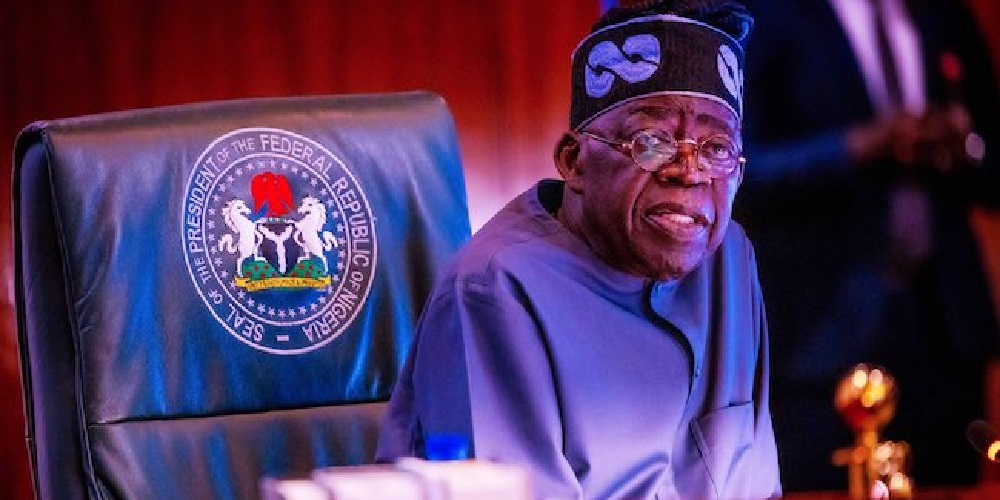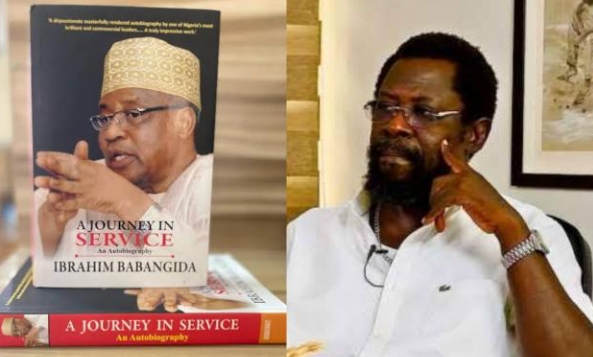News
One year on Tinubu’s watch, rule of law, justice sector reform yearn for change

On 24 April, Nigeria’s Senate President Godswill Akpabio, during the National Summit on Justice 2024 held in Abuja, recalled his frustrations in trying to secure the release of a serving senator from detention.
Konbowei Benso, who represents Bayelsa Central Senatorial District, was remanded in prison in March by a judge in Abuja after the lawmaker was arraigned for alleged forgery.
“The senator (Mr Benson) was there (in prison) for many days. If I have an opportunity, I will use this case as part of our (justice sector) reform. The rich also cry if Nigeria fails to reform its justice system,” Mr Akpabio, who was a minister and governor of oil-rich Akwa Ibom State, said.
Mr Benson, despite his privileged status, spent about a week in detention because of his inability to immediately meet his bail conditions. The process is difficult owing to the bottlenecks in Nigeria’s criminal justice system. The result of this is that Nigeria’s detention facilities are filled with many indigent defendants awaiting trial with no respite in sight.
Mr Akpabio’s lamentation, limited in scope as it was, signals that all is not well with Nigeria’s justice system.
President Bola Tinubu took office on 29 May as Nigeria’s fifth democratically-elected president since the return of civil rule in 1999, after running a campaign promising to uphold the rule of law and human rights.
“We will ensure that our nation’s legal framework is appropriate for the type of society we seek to build – a society that is fair and which provides enforceable rights to all Nigerians,” his manifesto read in part.
It further pledged that a Tinubu government “will operate on the premise that the rule of law is paramount” without giving details of how to make a difference in a country with a long history of egregious human rights violations under successive military and civilian administrations.
Inefficient justice system
Now a year in the saddle, the Tinubu-led government falters in upholding human rights and the rule of law in Nigeria.
While the problem of “long delays in hearing” and determination of cases is caused by multiple factors across the justice system, “poor coordination among the different actors in the sector and lack of effective legal aid to help the poor access justice” remain as major obstacles to a functional justice system, the President of the Nigerian Bar Association (NBA), Yakubu Maikyau, said at the recent justice summit in Abuja.
Mr Tinubu and the Chief Justice of Nigeria (CJN) acknowledged in their separate remarks at the summit that many Nigerians lack access to justice.
CJN Olukayode Ariwoola
“Access to justice remains a distant reality for far too many Nigerians,” Mr Ariwoola said.
Undoubtedly, Nigeria has made progress with the enactment of legislations such as the Administration of Criminal Justice Act 2015, the Nigeria Correctional Service Acts 2019, and the Nigerian Police Act 2020, but “there are still challenges ahead in achieving a justice system that works in the interest of Nigerians,” Mr Maikyau, a Senior Advocate of Nigeria (SAN), noted.
Like former Nigerian presidents who pledged to transform the country’s justice system for better service delivery, Mr Tinubu’s promise to deliver a legal framework “appropriate for the type of society we seek to build – a society that is fair and which provides enforceable rights to all Nigerians,” cannot be said to have started after one year in office as president.
“The present challenge is to translate these statements of commitment to tangible outcomes for all Nigerians…every aspect of the infrastructure of our justice system requires fundamental rethinking and retooling,” Mr Maikyau said.
Rule of law still tottering
The Tinubu administration, through the Attorney-General of the Federation, Lateef Fagbemi, tried to cut off from the poor human rights profile of the past administration of then-President Muhammadu Buhari, by terminating treasonable felony charges it filed against civil rights activist and Sahara Reporters publisher, Omoyele Sowore.
But by that time, Mr Tinubu’s democratic credentials had already been called into question.
His administration’s arbitrary arrests of former Governor of the Central Bank of Nigeria (CBN) Godwin Emefiele, the chairperson of the Economic and Financial Crimes Commission (EFCC), Abdulrasheed Bawa, were early indicators of what was ahead.
In breach of the provision of section 35 of Nigeria’s constitution, the pair were detained for months by the State Security Service (SSS) in Abuja.
Subsequent events also showed that the administration has yet to adopt the rule of law as a non-negotiable policy.
On his watch in the last year, law enforcement agencies and the military routinely engage in arbitrary arrests, detention and torture of civilians and in extreme cases, extrajudicial killings, while the courts are clogged with thousands of cases with less than a thousand judges adjudicating on them.
Riding on an amended Cybercrime Act, under the Tinubu administration, at least eight Nigerian journalists have been arrested and jailed, the US-based Committee to Protection Journalists (CPJ) said. CPJ, a nonprofit organisation, promotes press freedom across the globe.
The figure for the total number of press freedom violations by state actors is even higher, according to the Press Attack Tracker of the Centre for Journalism Innovation and Development. There have been 37 such incidents since Mr Tinubu assumed office with 23 of them happening in the last five months.
Two recent incidents highlight that there has been no improvement in press freedom in the country.
Segun Olatunji and Daniel Ojukwu, both Lagos-based journalists in southwestern Nigeria, were abducted by state authorities – military and police, respectively – over reports they authored.
Messrs Olatunji and Ojukwu were ferried from Lagos to Abuja, Nigeria’s capital, and held at separate times for almost two weeks before they regained their freedoms owing to sustained pressure from journalists and civil society organisations.
Mr Olatunji who worked at an online news outlet, FirstNews, was abducted by soldiers from his home in Lagos before he was handcuffed, blindfolded and thrown into the dungeon in Abuja.
Although Mr Olatunji has since resigned from FirstNews following the newspaper’s retraction of the offensive article which was against President Tinubu’s Chief of Staff, Femi Gbajabiamila, the Gestapo manner his rights were trampled upon reminds Nigerians of the jackboot era of military dictatorship.
Upon his release, he described the military as operating like bandits who abduct people from their homes only to dump the captives on a road after payment of ransom.
As Nigeria was preparing to join the rest of the world in commemorating the International Press Freedom Day on 4 May, Mr Ojukwu was abducted by the Intelligence Response Team (IRT) of the Inspector General of Police. He was detained at the State Criminal Investigation Department (SCID), Panti in Lagos for some days before he was flown to Abuja.
For a couple of days, the whereabouts of Mr Ojukwu who works at the Foundation for Investigative Journalism (FIJ) were unknown.
Fisayo Soyombo, founder of FIJ, an online newspaper, in a series of social media posts, said Mr Ojukwu was abducted by the police in breach of his fundamental rights as a journalist.
“Just so nobody is in doubt, what has happened to FIJ Nigeria reporter Ojukwu Justin Daniel is an abduction and not an arrest,” Mr Soyombo, an award-winning Investigative journalist, wrote.
Mr Soyombo said the “police cannot be acting like bandits” in a stable democracy where journalists’ responsibilities have statutory backing.
But the police have insisted they acted right after releasing Mr Ojukwu from a nine-day detention on 10 May. The police said their action was “lawful”, saying it was backed by a warrant of arrest from a magistrate court. The explanation has attracted similar condemnation from many Nigerians on X.
The Cybercrimes Act on which the police based their crackdown on journalists was amended recently by the National Assembly, expunging some of the provisions aimed at stifling Nigeria’s media space.
A major aspect of the law, section 24 which codifies the crime of “cyberstalking,” has been deployed relentlessly to hound journalists and human rights activists.
Before the amendments of the legislation last February, Section 24 criminalised the use of a computer in sending messages considered “grossly offensive, pornographic or of an indecent, obscene or menacing character.”
Despite the amendments, Omoyele Sowore, a pro-democracy activist and former presidential candidate, said the police have continued to use the law to harass and cower journalists and human rights campaigners in Nigeria. .
Acknowledging the abuses that might have occurred in the application of Section 24 of the Cybercrimes Act, a veteran journalist and human rights advocate, Richard Akinnola, referenced the arrest of Chioma Okoli by the police on account of reviewing a product on social media.
He recalled President Tinubu’s somewhat cordial relationship with the human rights community during the latter’s days as governor of Lagos.
Mr Akinnola, however, noted that the president cannot be absolved of the recent clampdown on journalist Olatunji by the Defence Intelligence Agency.
Nigeria ranks among the worst in press freedom
Reporters Without Borders (RSF) in its latest World Press Freedom Index ranked Nigeria as one of the most dangerous West African countries for journalists.
RSF is a global nonprofit organisation that defends the rights of people to have access to free and reliable information.
Data on the 2024 World Press Freedom Index by RSF ranks Nigeria 112th out of 180 countries where journalists are routinely monitored, attacked and arbitrarily arrested.
The 2024 ranking is an improvement over the 123rd place Nigeria occupied in 2023, but the RSF maintained that the “level of governmental interference in the news media in Nigeria is significant.” Major indices of the ranking were based on political, legislative, economic, social and security issues.
“It can involve pressure, harassment of journalists and media outlets, and even censorship. This interference is even stronger during electoral campaigns. Addressing political issues in a balanced way can also be difficult, depending on the media outlet’s owner. To a large extent, government officials have a say in the appointment and dismissal of media officials, whether in the public or private sector,” RFS said in the report.
Despite the pervading atmosphere of harassment and gross rights violations of journalists, the Attorney-General of the Federation and Minister of Justice, Mr Fagbemi, told the United Nations Human Rights Council in Geneva that “Nigeria remains one of the safest countries for journalists to ply their trade.”
Presenting the Universal Periodic Review (UPR) of Nigeria in Geneva, Switzerland in January, Mr Fagbemi cited the Nigerian constitution which empowers journalists to hold the government accountable to the people, saying journalists go about their duties with any form of intimidation. The UPR is a unique mechanism of the Human Rights Council that calls for each UN Member State to undergo a peer review of its human rights records every four and a half years.
[premium times]
News
Saudi Arabia donates 100 tonnes of dates to Nigeria as fasting approaches

By Kayode Sanni-Arewa
The Embassy of the Kingdom of Saudi Arabia in Abuja has held an official ceremony to distribute 100 tonnes (100,000kg) of dates to Nigeria as part of its annual humanitarian relief efforts.
The initiative, facilitated by the King Salman Humanitarian Aid and Relief Centre (KSrelief), aims to support vulnerable families across the country and strengthen the deep-rooted ties between the two nations.
During the ceremony, the Ambassador of the Custodian of the Two Holy Mosques to Nigeria, Faisal bin Ibrahim, conveyed the Kingdom’s dedication to humanitarian causes.
He expressed his profound gratitude to King Salman bin Abdulaziz and Crown Prince Mohammed bin Salman for their unwavering support in providing aid to Muslims and underserved communities worldwide.
He emphasised that Saudi Arabia remains steadfast in its commitment to fostering Islamic solidarity and providing relief to those in need.
Mr Al-Ghamdi explained that this year’s distribution includes 50 tonnes of dates for Abuja and another 50 tonnes for Kano, continuing Saudi Arabia’s tradition of assisting Nigeria through humanitarian donations.
He noted that the initiative represents the Kingdom’s broader mission to uplift Muslim communities, alleviate suffering, and promote unity, particularly during significant religious periods such as Ramadan.
The embassy, in collaboration with local authorities and humanitarian organisations, will ensure the proper distribution of the dates so that they reach the most vulnerable families in various regions of Nigeria
Saudi Arabia has been a longstanding partner in providing humanitarian aid to nations across the globe, including Nigeria. The Kingdom’s continued efforts in supporting food security and welfare initiatives exemplify its role as a global leader in charitable and humanitarian endeavours.
Through Vision 2030, Saudi Arabia seeks to expand its contributions to international humanitarian causes, reinforcing its dedication to fostering peace, stability, and prosperity worldwide. The ongoing provision of aid to Nigeria is a testament to these commitments and highlights the decades-long partnership between the two brotherly nations.
News
Babangida’s Book is filled with distorted facts, collection of lies, says Dele Farotimi

By Kayode Sanni-Arewa
Dele Farotimi, a human rights lawyer, has launched a heavy attack on former dictator Gen. Ibrahim Babangida (retd.), describing his reign as “ruinous”.
Farotimi, who lived through Babangida’s rule, recounted his experiences as a participant in the fight against the former leader’s “evil actions and inactions
Farotimi’s comments come after Babangida’s recent admission that Chief M.K.O. Abiola won the 1993 presidential election, which Babangida annulled.
The human rights lawyer expressed his disappointment, but not surprise, at the “mixed bag of lies, half-truths, urban legends, and obfuscations” in Babangida’s recent statements.
Farotimi’s criticism is not isolated, as many Nigerians have questioned Babangida’s legacy and the lack of consequences for his actions. The annulment of the 1993 election led to widespread protests and a prolonged struggle for democracy in Nigeria.
In a statement, Farotimi concluded, “No hagiographic allocutus can redeem the Evil Genius of Minna”.
The statement was shared on X while he was reacting to a comment made by Adnan Abdullahi Adam, which stated that “it’s better to read every side of exposition before forming your own judgement”.
With the cover picture of the IBB’s memoir “A Journey In Service” @realadnantweet wrote:
“I think IBB’s memoir: “A Journey in Service” exposes a fresh perspective on everything.
“It’s better to read every side of exposition before forming your own judgement.
“Everyone should try reading the book as jury to the plea of the accused.”
Responding Farotimi wrote: “I lived through his ruinous reign. I wasn’t a passive victim of his evil actions and inactions, I was a participant in the fight to be freed of him.
“I am painfully aware of the extent of his evil capabilities, and I have not been disappointed by the mixed bag of lies, half truths, urban legends, and obfuscations contained in the excerpts already in the public domain. No hagiographic allocutus can redeem the Evil Genius of Minna.”
On Thursday, February 20, 2025, former Nigerian military ruler General Ibrahim Badamasi Babangida (IBB) released his long-anticipated autobiography, “A Journey in Service.”
The memoir has ignited a firestorm of controversy, with critics accusing Babangida of distorting historical events and maligning deceased individuals who cannot defend themselves.
This development has reopened debates about his tenure and its lasting impact on Nigeria’s political and economic landscape.
Babangida’s tenure from 1985 to 1993 was marked by the implementation of the Structural Adjustment Programme (SAP), among others. In “A Journey in Service,” he provides an insider’s perspective on the adoption of SAP, aiming to offer context for the controversial policy that aimed to liberalize Nigeria’s economy.
While intended to address economic challenges, SAP led to widespread protests and debates due to its harsh austerity measures and the social hardships it imposed.
Critics, however, contend that Babangida’s memoir serves as a self-exoneration tool, selectively presenting events to absolve himself of blame.
Human rights lawyer and former Chairman of the Nigerian Human Rights Commission, Prof. Chidi Odinkalu, described the book as a “pack of lies,” accusing Babangida of making allegations against deceased individuals who cannot contest his claims.
Odinkalu further criticized Babangida for portraying himself as a victim of circumstances orchestrated by those who are no longer alive to defend themselves.
The memoir has also rekindled discussions about Babangida’s annulment of the June 12, 1993, presidential election, widely regarded as one of Nigeria’s freest and fairest elections. In the book, Babangida attempts to justify the annulment, a move that plunged the nation into political turmoil and prolonged military rule. Many Nigerians view this action as a significant setback to the country’s democratic progress.
News
Saudi Arabia plans to invest $600bn in new US trade over 4 years

By Kayode Sanni-Arewa
Saudi Arabian Crown Prince Mohammed bin Salman told President Donald Trump that the kingdom wants to put $600 billion into expanded investment and trade with the United States over the next four years, the Saudi State news agency said early on Thursday.
In a phone call between the two leaders, the crown prince said the Trump administration’s expected reforms could create “unprecedented economic prosperity”, the state news agency reported.
The report said Saudi Arabia wants its investments to capitalize on these conditions. It did not detail the source of the $600 billion, whether it would be public or private spending nor how the money would be deployed.
The investment “could increase further if additional opportunities arise”, the agency quoted Bin Salman as telling Trump.
Trump fostered close ties with Gulf states including Saudi Arabia during his first term. The country invested $2 billion in a firm formed by Jared Kushner, Trump’s son-in-law and former aide, after Trump left office.
Trump said following his inauguration on Monday that he would consider making Saudi Arabia his first destination for a foreign visit if Riyadh agreed to buy $500 billion worth of American products, similar to what he did in his first term.
“I did it with Saudi Arabia last time because they agreed to buy $450 billion worth of our product. I said I’ll do it but you have to buy American product, and they agreed to do that,” Trump said, referring to his 2017 visit to the Gulf kingdom.
The Reuters Daily Briefing newsletter provides all the news you need to start your day. Sign up here.
Reporting by Hatem Maher; Editing by Leslie Adler and Cynthia Osterman
-

 News23 hours ago
News23 hours agoJust in : Senator Gumau is dead
-

 Metro16 hours ago
Metro16 hours agoInsecurity! Gunmen invade church, slash pastor’s 2 fingers
-

 News22 hours ago
News22 hours agoI have never insulted President Tinubu in my entire life”-Gov Adeleke
-

 News22 hours ago
News22 hours agoPolice seal OSSIEC office, officials nabbed, says chairman
-

 News24 hours ago
News24 hours ago10th NASS Committed to Constitutional Reforms – Kalu
-

 News23 hours ago
News23 hours agoRep Salam Congratulates Governor Adeleke On Successful Conduct Of LG Elections
-

 Metro16 hours ago
Metro16 hours agoFire engulfs MTN office in Oyo
-

 Foreign15 hours ago
Foreign15 hours agoPentagon set to sack 5400 staff as attack hits Trump’s downsizing plan







